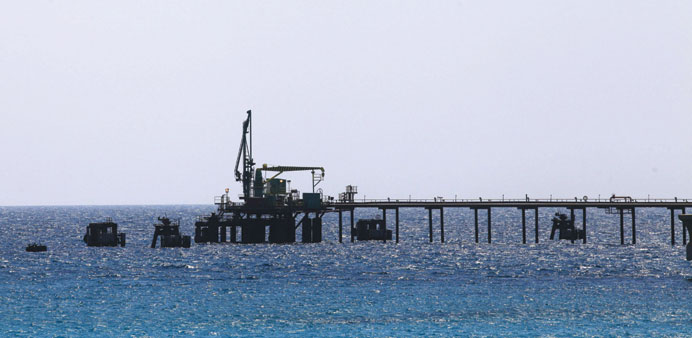A general view shows pipelines at the Zueitina oil terminal, about 120km west of Benghazi (file). Libya, holder of Africa’s largest oil reserves, produced about 1.6mn bpd before the 2011 rebellion that ended Muammar Gaddafi’s 42-year rule.
Bloomberg/London
Libya may double crude output to 800,000 bpd by next month amid mediations to reopen oil and gas pipelines feeding export terminals, on the occasion of the Muslim holy month of Ramadan that starts this week.
“There are efforts under way and initiatives that will be proposed during the blessed month of Ramadan to reopen the oil and gas pipelines to the ports of Zueitina, Zawiya and Mellitah,” Mohamed Elharari, a Tripoli-based spokesman of state-run National Oil Corp, told the Libya news agency Lana yesterday. “If these initiatives succeed, Libya’s crude output could rise to nearly 800,000 bpd.”
The North African nation is now producing between 400,000 bpd and 460,000 bpd, the Tripoli-based chairman of NOC, Mustafa Sanalla said in an interview yesterday on the sidelines of the World National Oil Companies Congress in London. The country hopes to lift output to 600,000 bpd in next few weeks, he told the conference.
Libya, holder of Africa’s largest oil reserves, produced about 1.6mn bpd before the 2011 rebellion that ended Muammar Gaddafi’s 42-year rule. The country has failed to restore output capacity as militias fought for the control of export terminals while tribes and workers blocked operations at fields and pipelines to seek jobs and better pay.
The country is refining about 130,000 bpd and exporting about 300,000 bpd of crude, Sanalla said in the interview. The eastern oil fields of Mesla and Sarir and the offshore fields of Jurf and Bouri account for most of the current production, he said.
Libya has been divided since last year between an internationally recognised government that operates from the east, and an administration that rules over the capital Tripoli and most of the western region, backed by moderate Islamist groups. Armed militants loyal to the Al Qaeda and Islamic State organisations control the town of Sirte, in the centre, and Derna, in the east, threatening the two administrations.
While National Oil Corp’s management is also split in two, the company continues to coordinate on crude deliveries to the refineries, Sanalla said. The Hariga oil port in the east is sending crude to the Zawiya refinery in the west. The pipeline that supplies crude to Zawiya was shut by a militia last year.
Sanalla said he was optimistic that UN-sponsored talks between the two administrations would allow the reopening of Es Sider and Ras Lanuf, the nation’s largest and third-largest oil ports, in four to five weeks.
The two export terminals, shut in December after attacks by militias loyal to the Tripoli government, have a “good quantity” of crude in storage, Sanalla said, without indicating a specific volume. Should they reopen, NOC would only release them to the world market “gradually” so as not to drive the price of its crude lower, he said.
The nation seeks to boost oil production to 1mn bpd by the end of the year and 2.1mn bap in 2017, he said.

